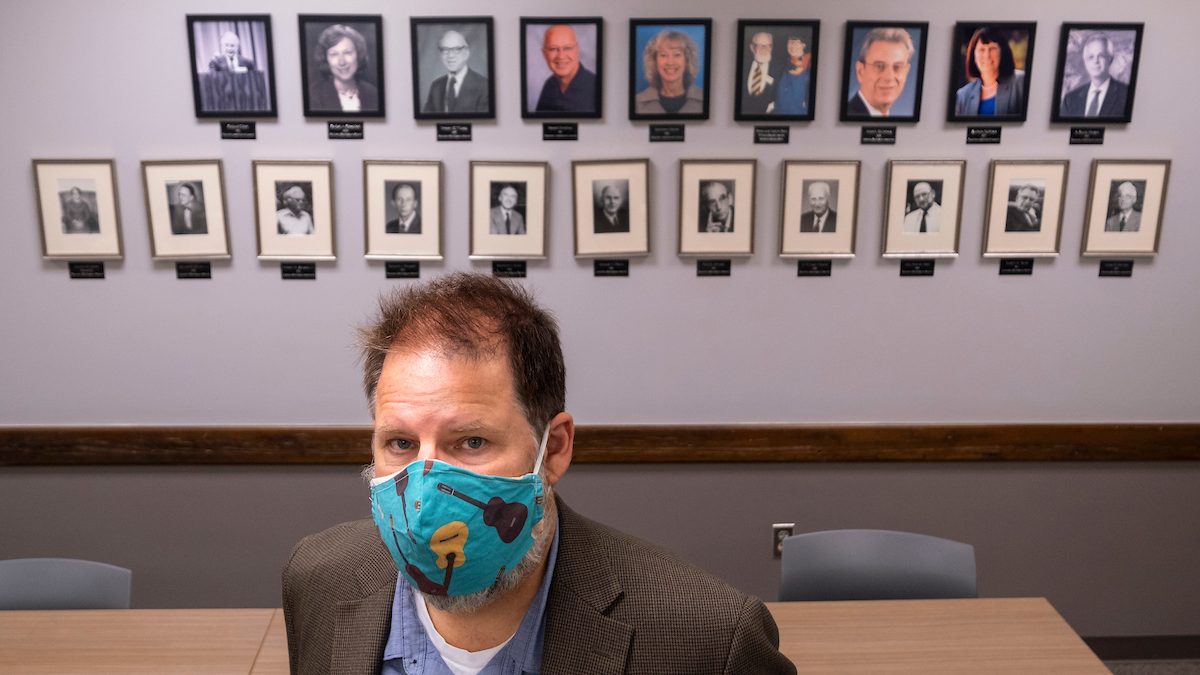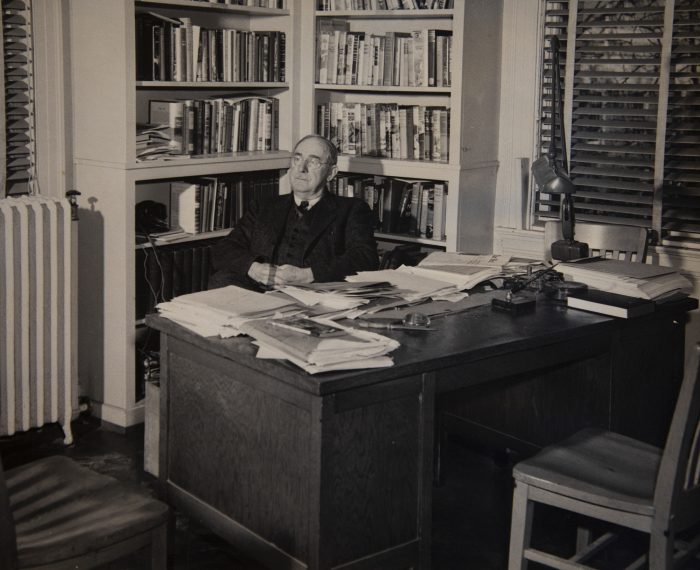
When looking for leaders over the past century, national organizations and the University have repeatedly turned to Carolina’s sociology department.
A room on the first floor of the building that houses Carolina’s sociology department has an especially meaningful decorative touch. This room’s crowded “wall of fame” features framed portraits of each sociology faculty member who has served as the president of the discipline’s most prestigious organizations, including the American Sociological Association, the Southern Sociological Society and the Population Association of America.
“It fills the length of one wall,” said Charles Kurzman, Philip Stadter Distinguished Professor of sociology. “It’s very impressive.”
As often as national organizations tap sociology faculty members as leaders, the University turns to the department to head centers and institutes, serve as administrators and lead campus-wide initiatives, Kurzman added. “I don’t know of any department that has as broad array of University leadership roles as our department does.”
The sociology department had planned to celebrate its centennial with a springtime symposium. But with the pandemic’s disruption to group gatherings, the celebration has been virtual as the department looks back on 100 years of its influence here and around the world.

A rich history
A Georgia native with doctorates in psychology and sociology, Howard W. Odum founded Carolina’s sociology department and the School of Public Welfare (now the School of Social Work) in 1920. In that same decade, Odum also established the university press, the journal Social Forces and the institute that became the Howard W. Odum Institute for Research in Social Science.
“Odum really looms large for the first few decades of the department’s history, both as an intellectual force and as an institutional force,” said current department chair Kenneth (Andy) Andrews, Matthew Mason Distinguished Professor of sociology. “He really created institutions that are still central to the University.”
Odum recruited faculty interested in population studies, which eventually led to the establishment of the interdisciplinary Carolina Population Center, and regional studies, which developed into the Center for the Study of the American South. Other longstanding areas of study in the department include work and inequality, transformation of economies and political institutions and health and health inequalities.
“It’s always been ranked nationally as a Top 10 if not a Top 5 department,” said Kenan Distinguished Professor of sociology Arne Kalleberg, former department chair and ASA president (2007-8).
While Odum’s early focus was on the South, the department quickly expanded its interests to national and international studies, Kalleberg said. He pointed out that the journal he edits, Social Forces, is the only one of the discipline’s top three journals that doesn’t restrict itself to “American” in its title. The members of its editorial board represent 46 different countries.
“You really can’t understand many of the key issues of the day unless you take a global perspective,” Kalleberg said.
Legacy of leadership
With his ambitious expansion of sociology into schools and centers, Odum set the example for sociology faculty to look beyond their department in serving the University. “Many people in this department have played key leadership roles in the University, going back to Odum,” Andrews said. “You can see and feel that impact throughout the University.”
Speculating on why the department is tapped so often, Andrew Perrin, Ruel W. Tyson Jr. Professor of the Humanities, said, “In part, it’s that sociologists think a lot about institutions. People who go into sociology are motivated to try to help, to make things better. We have a way of thinking about things that make us good at bridging boundaries.”
Here are few examples of administrative leadership from the sociology department:
- Kenan Distinguished Professor Barbara Entwisle, former vice chancellor for research; former director of the Carolina Population Center;
- Perrin, director of the Institute for the Arts and Humanities; former director of Carolina Seminars Program; chair of the coordinating committee that developed the new IDEAs in Action general education curriculum;
- Kalleberg, chair of the curriculum in global studies; former senior associate dean for social sciences and global studies in the College and senior associate dean in the Graduate School;
- Kenan Distinguished Professor Emeritus John Kasarda, director of the Center for Air Commerce in UNC Kenan-Flagler Business School; former director of the Frank Hawkins Kenan Institute of Private Enterprise;
- William Rand Kenan Jr. Professor Emeritus John Shelton Reed, co-founder and longtime director of the Center for the Study of the American South; founding co-editor of Southern Cultures; former director of the Odum Institute; and
- Kurzman, co-director of the Center for Middle East and Islamic Studies.
The department’s prominence in administration may be special to Carolina. When she attended national meetings as vice chancellor for research, Entwisle discovered she was often the only social scientist at the table. “It is extremely unusual for social scientists to have that job. I guess people don’t usually think of them in this role,” she said. “But as a social scientist, I was very well prepared for the role because I was interested in how things work around me. I had a social network perspective on the University. And I understood that my job was to connect all these different groups together so that information could flow and new collaborations be made.”
The more things change…
Carolina’s sociologists have continued to break new ground in their discipline in the past 100 years. “This department has been in the forefront of some of the new thinking that’s come out in the time since then,” Entwisle said. “We’re approaching health in revolutionary new ways and leading in integrating biological ways of thinking about human behavior with social ways of thinking about it.”
Andrews pointed to several assistant professors who are studying “things Odum could not have foreseen”:
- Scott Duxbury, on the dark web and criminal networks on the internet;
- Taylor Hargrove, on racial disparities in health and biases related to gender, race and skin tone;
- Tania Jenkins, on how medical professionals get sorted into career tracks based on whether they are born here or somewhere else;
- Alexandrea Ravenelle, on the gig economy and how it will affect the future of work;
- Jessica Su, on changes in family such as increasing cohabitation and the consequences of unintended fertility; and
- Kate Weisshaar, on how employers screen online applications in ways that disadvantage people who “opt out” for family demands.
Yet some important topics in sociology are as relevant now as in Odum’s time. “Many of the issues that were driving the founding of this department remain crucial issues for our state and our country and for the world today a century later,” Kurzman said. His list included the Spanish Flu pandemic, the suffragist movement for women’s rights, the Jim Crow backlash to calls for racial equity, the stark economic inequality of the Roaring ’20s and the Red Scare’s fears of socialism. “The world is so different now, but so many of these issues are still here.”
By Susan Hudson, The Well
